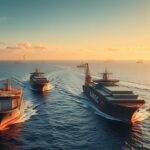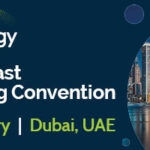World Maritime Day 2025: A Global Celebration of Commitment and Responsibility

Every year, World Maritime Day provides an opportunity to recognise the indispensable role shipping plays in global trade, cultural exchange, and environmental stewardship. On 25 September 2025, countries, institutions, and companies around the world marked the day under the theme: “Our Ocean, Our Obligation, Our Opportunity.”
The events highlighted both the progress made in maritime safety, sustainability, and innovation, and the challenges that remain in protecting ocean health while sustaining an industry that underpins 80% of global trade.
This article reviews how World Maritime Day was observed across the globe in 2025, offering insights for industry leaders, policymakers, and stakeholders.
The Significance of the 2025 Theme
The IMO’s chosen theme — Our Ocean, Our Obligation, Our Opportunity — reflects a clear shift in emphasis. The global conversation is no longer just about maritime commerce but about shared responsibility.
-
Obligation underscores the duty of all stakeholders to safeguard the seas.
-
Opportunity highlights the potential for innovation, cleaner fuels, and digital solutions.
-
Ocean serves as the reminder that shipping and the marine environment are inseparable.
This framing ensured that celebrations were not only ceremonial but also anchored in strategic discussions on the future of shipping.
Celebrations in the United Kingdom
In the UK, maritime heritage and modern innovation came together in a series of symbolic and practical gestures.
Flag Raising and Illuminations
The Maritime and Coastguard Agency (MCA) flew both the Red Ensign and the IMO flag at its Southampton headquarters. Buildings were lit in shades of blue, a visual message of unity with the global maritime community.
Commitment Statements
The UK government used the day to reaffirm its investment in:
-
Green shipping corridors
-
Cadet training modernisation
-
Improved pollution response capacity
-
Support for seafarer welfare
Industry stakeholders also drew attention to Britain’s expanding role in marine innovation, from decarbonisation projects to offshore wind logistics.

Bangladesh: Maritime Pride in Chattogram
Bangladesh’s port city of Chattogram staged one of the liveliest public celebrations.
-
A procession, organised by the Bangladesh Merchant Marine Officers’ Association, filled the streets with cadets, officers, and students.
-
At the Marine Academy, cadets presented a guard of honour to senior captains, showcasing respect for tradition and the promise of the next generation.
-
Industry representatives highlighted the country’s growing shipping sector, critical to its export economy.
The focus in Bangladesh was not only pride in its maritime workforce but also a call to strengthen training, resilience, and sustainability.
Corporate Sector Engagement
Disney Cruise Line
The cruise industry, often scrutinised for its environmental footprint, used the day to highlight progress:
-
Waste segregation and recycling at sea
-
Reduction of single-use plastics
-
Increased use of liquefied natural gas (LNG) and hydrotreated vegetable oil (HVO)
-
Adoption of shore power to cut emissions in port
Crew members were celebrated as the frontline custodians of both guest experience and sustainability practices.
Broader Industry Reflection
Shipping companies, classification societies, and trade associations issued statements, published thought pieces, and held webinars. Common themes included:
-
The commercial impact of global trade slowdowns
-
Rising costs of compliance with green regulations
-
The tension between operational demands and environmental responsibility
Global Spotlights
United Arab Emirates: Host of the Parallel Event
The IMO’s parallel event was held in the UAE, drawing ministers, shipping executives, and international regulators. Discussions focused on:
-
Green corridors linking Middle Eastern ports with Asia and Europe
-
Digital solutions for port efficiency and cargo tracking
-
The region’s role as a hub for energy transition, balancing fossil fuel exports with renewable investment
The UAE positioned itself as a bridge between tradition and innovation — a place where oil tankers and hydrogen-ready vessels may soon share the same waters.
Japan: Technology and Tradition
Japan marked the day with a blend of ceremony and cutting-edge technology demonstrations.
-
Leading shipbuilders unveiled progress on ammonia-fuelled engines and hydrogen carriers.
-
Ports like Yokohama showcased smart logistics systems that cut congestion and emissions.
-
Ceremonial events honoured the long-standing link between maritime culture and national prosperity.
Japanese celebrations emphasised how heritage and innovation can coexist, with technology positioned as the guardian of tradition.
South Korea: Leadership in Green Shipbuilding
South Korea used the day to spotlight its shipyards, now leaders in methanol-ready tankers and dual-fuel container vessels.
-
Educational forums at Busan Maritime University stressed the importance of training engineers for a decarbonised fleet.
-
The government reiterated its commitment to supporting shipping companies transitioning to new fuels.
South Korea’s observance reflected its strategy: staying ahead of global competitors by marrying industrial capacity with sustainability goals.
Africa: Spotlight on IUU Fishing and Blue Economy
Several African countries held regional events with a strong focus on illegal, unreported, and unregulated (IUU) fishing.
-
In Kenya, speeches at Mombasa port linked maritime enforcement with food security.
-
Ghana announced new monitoring agreements to track fishing vessels via satellite.
-
South Africa highlighted the role of ports in its “Blue Economy” strategy, tying shipping development to sustainable fisheries and offshore energy.
For Africa, the day was less about ceremonial celebration and more about using the maritime agenda to protect livelihoods and ensure fair access to resources.
Europe: From Rotterdam to Athens
Across Europe, major ports ran awareness campaigns.
-
Rotterdam showcased its hydrogen import facilities, positioning itself as a gateway to a green energy economy.
-
Athens and Piraeus hosted conferences on seafarer welfare, reflecting Greece’s continuing role as a shipping powerhouse.
-
Northern European ports emphasised digitalisation and cyber-resilience as key maritime security themes.
North America: Industry Forums and Community Engagement
In North America, events combined boardroom discussions with community outreach.
-
The United States Coast Guard marked the day with statements on maritime safety and security, while shipping associations hosted forums on decarbonisation pathways.
-
In Canada, educational institutions ran open days, giving students the chance to meet seafarers and explore maritime careers.
-
Ports along the Great Lakes region highlighted the environmental role of inland shipping in reducing road congestion and carbon emissions.
What Worked Well
1. Widespread Engagement
From symbolic gestures like flag-raisings to concrete commitments in training and sustainability, participation was global and varied.
2. Visible Corporate Responsibility
Companies across shipping, cruise, and logistics industries issued clear, measurable pledges, giving the day more than symbolic value.
3. Integration of Trade and Ecology
Many events successfully tied together the commercial and environmental aspects of shipping, reinforcing that prosperity and protection must go hand in hand.
Challenges That Remain
-
Symbolism vs. Substance
Flag-raisings and speeches are meaningful but need to be matched with binding policies and investment. -
Uneven Coverage
Some regions, especially developing maritime nations, saw little visibility. Broader outreach could help. -
Balancing Economics and Ecology
Rising costs for ship operators may threaten compliance. Support mechanisms and financing models are urgently required.
Opportunities Ahead
World Maritime Day has again made clear that the industry stands at a crossroads. The obligations are pressing — climate change, pollution, workforce welfare — but the opportunities are equally vast:
-
New fuels such as ammonia and hydrogen
-
Digitalisation of navigation, safety, and logistics
-
Cross-border partnerships for green corridors
-
Maritime education to prepare future officers for a decarbonised fleet
Conclusion
World Maritime Day 2025 succeeded in spotlighting both the pride and the responsibility that define the maritime sector. Whether in London, Chattogram, Busan, or aboard a cruise ship at sea, the message was the same: our shared ocean is both a duty and an opportunity.
The task now is to translate commitments into action — not just once a year, but every day.















